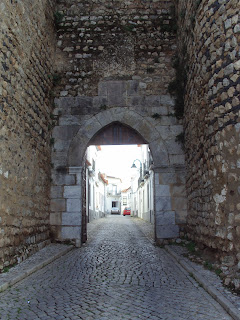 Serpa is of ancient origins and its establishment probably preceded the coming of the Romans to the area. After the Roman occupation, the neighbouring town of Beja became the Roman capital of Pacensis (southern subdivision of Lusitania province) and Serpa was settled by Roman settlers. The archeological remains of a Roman Villa today lie close to Serpa.
Serpa is of ancient origins and its establishment probably preceded the coming of the Romans to the area. After the Roman occupation, the neighbouring town of Beja became the Roman capital of Pacensis (southern subdivision of Lusitania province) and Serpa was settled by Roman settlers. The archeological remains of a Roman Villa today lie close to Serpa. The Moors settled in Serpa after their invasion of the Iberian Peninsula and remained until their defeat at the hands of Portuguese forces fighting their way south during the period of the Reconquista (the Christian re-conquest of Iberia).

As a result of Serpa's proximity to the Spanish border, the town has always been a defensive stronghold and today is still surrounded by thick castle walls. The town castle stands in the middle of town and is partly damaged as a result of the last Spanish invasion. Owing to its rich past, Serpa offers much in historical interest to visitors, including archeological sites, the town walls, the castle, the aqueduct, the clock tower, the town's museum and numerous interesting old churches.
 The area surrounding Serpa consists mostly of wheat farms and wheat has traditionally been the staple of the local economy employing many people. Due to the area's strong agricultural reliance much of the area's people have traditionally been peasants or sheep herders. After the Portuguese Revolution of 1974 the Portuguese Communist Party gained strong support in the area and its popularity continues to this day.
The area surrounding Serpa consists mostly of wheat farms and wheat has traditionally been the staple of the local economy employing many people. Due to the area's strong agricultural reliance much of the area's people have traditionally been peasants or sheep herders. After the Portuguese Revolution of 1974 the Portuguese Communist Party gained strong support in the area and its popularity continues to this day. 
Today many urban residents of Lisbon, Beja and other cities maintain country homes in Serpa or take weekend breaks to the area as a result of Serpa's rural location and laid back lifestyle. Serpa is famous for its cheese, a spicy and strong-smelling cheese made in the area and eaten throughout Portugal, although a good one is now hard to find. Other local and regional specialties include Shepherd's Lamb Stew, a Clam and Pork dish and Sweet Potato Pastries.

Sem comentários:
Enviar um comentário